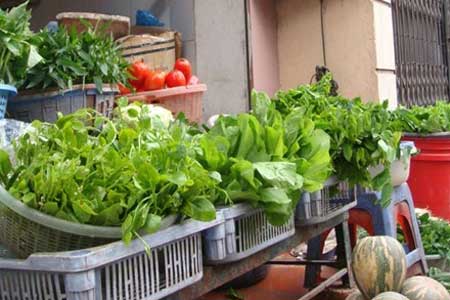VietNamNet Bridge – More than 1,100 businesses out of 7,000 that produce and trade in agricultural products were found to have broken food safety regulations during the first half of the year.

|
Nguyen Nhu Tiep, director of the National Agro – Forestry – Fisheries Quality Assurance Department at the Ministry of Agriculture and Rural Development revealed the information at a meeting in Ha Noi yesterday.
His information was based on recent inspections from 30 cities and provinces throughout the country.
Tiep also revealed that the A, B and C standards in the food quality rankings of food producing businesses, the C ranking (lowest quality) was still very high, with 25 per cent of all inspected agricultural and seafood processing plants and nearly 65 per cent of slaughterhouses recording a C ranking.
In response to the situation, Minister of Agriculture and Rural Development Cao Duc Phat said the C-ranked businesses must be strictly dealt with to prevent any illegal profits from being made.
The Plant Protection Department also revealed that out of 17,037 samples of imported foods inspected by the department this year, over 290 fruits and vegetables were found to contain pesticides and other chemicals beyond permissible levels.
Nguyen Xuan Hong, director of the Plant Protection Department said the department had recently completed its work analysing the safety of fruit and vegetables grown in Viet Nam.
The results revealed that grapes tend to be the fruit most in jeopardy, while rau muong (water morning glory) and rau ngot (sauropus androgynus, or sweet leaf) are the two riskiest types of vegetables.
In particular, a recent inspection of 25 samples of sweet leaf in Ha Noi and HCM City revealed that 87 per cent of the samples still contained residues of chemicals used to protect crops.
The rampant use of special fertillisers aimed to grow fruit much faster, was another issue of great concern at the meeting.
Hong said that using plant stimulants, made in China, was illegal because no enterprise has legally registered to import this kind of product.
Hong said in response to the situation, that towards the end of the year, a list of substances and chemicals which are permitted in Viet Nam will be made public to prevent the far ranging use of chemicals on plants.
Minister Phat said that towards the year-end, the agricultural authorities need to focus its inspections on the use of crop protection chemicals, fertilisers and the operations of slaughterhouses.
He added that employing an independent agency to carry out the supervisions and inspections in these three areas might help to bring about some changes.
Phat also said that areas with a history of producing unsafe food needed to be identified for closer control while inspections should focus on dodgy fruit and vegetables.
Source: VNS